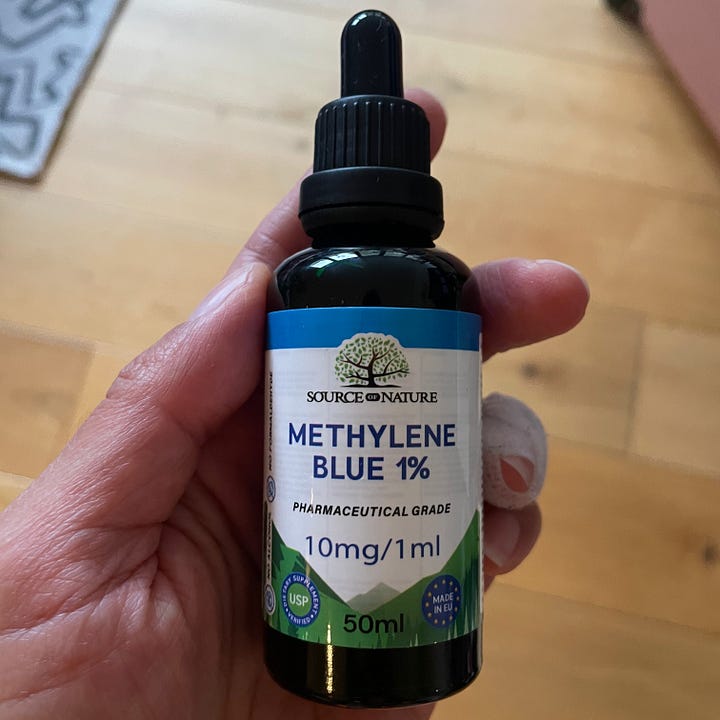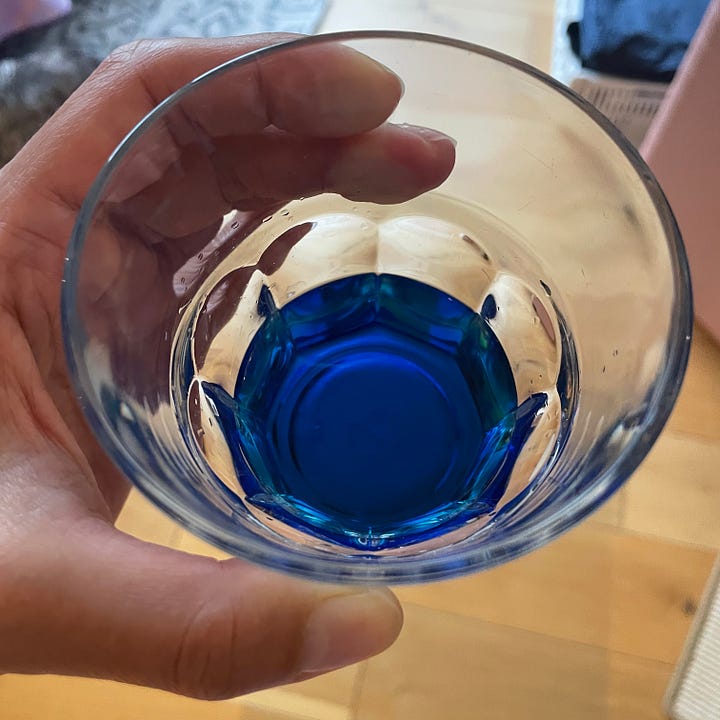Life lately: a cauldron of chaos + some biohacking
What I'm currently loving, learning about, and struggling with
I’m sitting here on a Saturday evening, cycle day 22, chest aching from coughing (yet another viral infection), many thoughts swirling.
Over the last few days I’ve had an influx of ideas I want to write about and share, but now that I’m sitting in front my computer, I’m struggling to coalesce these into something tangible (story of my life 😅).
After my previous two educational-leaning pieces, I wanted to bring it back to a more personal update and talk about some things I’m currently loving, learning about and struggling with.
I’ve mentioned that life lately has been challenging. Between what’s happening in the world, what’s happening in my industry of work (AI), my relationships (two family deaths in two months) and my body (perimenopause)… let’s just say it has been a cauldron of chaos.
I won’t go into what’s happening in the world coz you all know already (and don’t need any more doom-scrolling).
But the changes in my work industry and body have impacted me a great deal, causing immense stress and anxiety at times. I won’t lie — it has been really hard.
I’ve had to lean on all the tools I have available to manage the sometimes overwhelming waves of anxiety and fear that comes with being “between jobs”, a “budding entrepreneur” and watching your savings dwindle (the struggle nobody really talks about).
One helpful nugget of wisdom I was reminded of recently was about acceptance. Accepting that anxiety and fear were going to be present on this journey, rather than trying to fight or resist it. The act of acceptance itself seems to help reduce its intensity.
And then there’s perimenopause, which has been an interesting ride so far. A recent blood test showed my FSH jumped from 8.2 last year to 18.4 — a clear sign my ovaries are winding down. Reminder: FSH (follicle-stimulating hormone) is the signal sent from the brain to the ovaries telling them to grow and release eggs. A higher FSH means there are less follicles available to communicate with, so the brain has to “yell” to try to be heard. An FSH above 10 is a sign you’re moving closer to menopause.
The symptoms have been fairly minimal and I’m ovulating consistently, but a few things have become more noticeable in recent months — namely brain fog and forgetfulness — and also changes to my immunity and blood markers.
I’ve lost count of the number of times I’ve arrived somewhere realising I’d forgotten an important item (eg. my swimsuit when going to the sauna 🤦🏻♀️). Or walking into a room to do something and then promptly forgetting what I wanted to do.
This can be caused by fluctuating levels of oestrogen.
If you are struggling with this - I highly recommend reading The Menopause Brain by Dr Lisa Mosconi — in fact, I’d recommend anyone with ovaries read it no matter what age, because you’ll go through this eventually (sorry, but it’s true). For some it can start as early as 35.
I am also dealing with heavy periods due to uterine fibroids (which I wrote about last July) but the full picture likely also involves perimenopausal fluctuating hormones. I’m still waiting to complete a DUTCH test (Dried Urine Test for Comprehensive Hormones) — to dig deeper into things, but timings have not aligned and unfortunately, I am now anaemic (according to my latest blood test results).
It’s hard for me to share this as a menstrual cycle & hormone health coach because I feel like I’m supposed to have it all in hand. But I’ve realised this is an unrealistic expectation I’ve placed on myself and it benefits nobody. I am hoping that sharing my authentic journey and struggles will be helpful for people to see.
What I’m currently loving
As mentioned earlier, I’ve been making the most of natural therapies to support myself during this time. Aside from my nutrition and lifestyle foundations, here are a few other things I’m loving right now.
Castor oil
Best known for it’s use making castor oil packs, it has been a regular thing for me in recent months. I use it for anything from liver detoxification and gut health, to improving bowel movements (yes it seriously works), asthma, coughing, or sinus congestion relief (I learnt this last one from my massage therapist). It even improves skin texture, which I consider a little bonus benefit.
This is due to the ricinoleic acid in castor oil, which helps reduce inflammation while promoting circulation and lymphatic flow. It also binds to prostaglandin receptors, making it particularly helpful for premenstrual cramps.
I tend to skip the faff of packs and simply apply it where needed (liver, stomach, chest, nose) before going to bed, giving it 10 seconds of heat with a hairdryer for absorption, and then leaving it overnight. Totally me being lazy + pragmatic.. but it works! 🤷🏻♀️
Red light therapy
Also known as photobiomodulation (which I’ve mentioned in a previous post and on Instagram), this non-invasive therapy uses red and near-infrared light (600–1100 nm) to stimulate biological processes at the cellular level. It’s been shown to enhance cellular function, reduce inflammation, and improve blood flow.
In fact, a biochemist friend of mine once told me that during their photobiology studies, they managed to keep blood circulating in a deceased lab mouse for 30 minutes using red light alone. Crazy, right? In his words “670nm red light is the most potent biological force in nature”.
I use it to support sleep quality since it mimics the sun’s wavelengths at sunrise and sunset, helping to regulate our circadian rhythm and melatonin production — especially useful if you can’t always get outside at those times. I originally bought mine in 2019 to help with persistent injuries and joint issues, but later discovered its skin benefits too (which is what it’s mostly marketed for these days). I also love using an infrared sauna to support liver detoxification — it’s made a huge difference in reducing many symptoms I used to struggle with.
I even use red light on my cat and she loves it. ☺️
Vitex
Also known as Chaste Tree Berry (Vitex agnus-castus), this herb is well-known for its ability to naturally support progesterone levels and help normalise shortened luteal phases. Dr. Carrie Jones (aka the Queen of Hormones) calls it the “Ovarian Adaptogen” — and she’s a big fan.
I’ve been taking Vitex for the past year to support my progesterone levels, and it’s made a noticeable difference. My mood has improved, and my luteal phase has lengthened. Without it, I imagine I’d be dealing with a lot more perimenopausal symptoms during this phase. I follow Lara Briden’s protocol of taking five days off during my bleed each cycle, and on the other days, I take 8–10 drops of this tincture first thing in the morning. This provides roughly 400mg of the dry herb equivalent (for reference, typical dosages range from 40–500mg).
Methylene Blue
⚠️ Disclaimer: This is more in the realm of experimental biohacking. It is not a natural remedy but rather a synthetic compound. If you’re considering trying it, please do your own research and consult a trusted health practitioner, as there are important contraindications (such as SSRI medications, St. John’s Wort, and others).
If you’re curious about the history and mechanisms of Methylene Blue, I recommend checking out this video. In short, it’s a powerful oxygenator and mitochondrial enhancer with antioxidant, anti-inflammatory, and antimicrobial properties. It has been used to treat conditions like carbon monoxide poisoning, septic shock, anaphylaxis, fatigue, brain fog, memory loss, depression, candida, nerve degeneration, gout, and even long COVID.
It’s also infamous for staining your tongue blue and making your pee turn green/blue — don’t worry, it’s temporary!
It’s been on my radar for the past year or so as I’ve seen it gain traction in the biohacking space — including mentions on Huberman Lab. But why the SSRI warning? Methylene Blue inhibits monoamine oxidase-A (MAO-A), an enzyme that breaks down serotonin. This can boost mood, but at higher dosages (0.7–1 mg/kg body weight, typically administered intravenously), it increases the risk of serotonin syndrome when combined with serotonin-enhancing drugs.
But after diving into the research, I’ve realised that oral dosing is quite different from intravenous use and doesn’t have the same impact — especially at the super low doses I use. We’re talking just 1–4 mg in total versus 42–60 mg for a 60 kg person. Still it is something worth being super cautious about.


My experiment with Methylene Blue has been the most profound out of all the supplements and nootropics I’ve tried. It seriously improves my overall mood, energy, focus and motivation. I feel genuinely happier when I use it — you know, like those days you sing little happy tunes to yourself coz you’re in a particularly good mood? That.
I take only small amounts (1–2mg), a few times a week at most. Some weeks, I don’t take it at all, because I don’t feel I need it (and I don’t want to become dependant on it). Also, it tastes rank. 🤮
The first time I tried it, I did a high-intensity workout that pushed my heart rate to 180 BPM — without feeling strained or out of breath. Holy crazy oxygenator. It also gave me super vivid dreams that night, though that side effect has faded over time. The highest dose I’ve tested is 4mg, and I use a Pharmaceutical Grade USP solution (getting a safe source is another issue with this stuff).
One useful hack I discovered on reddit was to add vitamin C powder to the water with the methylene blue and wait until it turns colourless to avoid staining the mouth. Neat science trick. I also thoroughly rinse my mouth after, though it doesn’t really leave much stain because my dosage is small. Another level-up is to pair it with red light therapy for an added synergistic boost — they work together to enhance mitochondrial function even further.
Well, hope you’ve found this interesting. I know some women dislike “biohacking” but personally, I find it fascinating, empowering and fun. I genuinely love to experiment with new ways to optimise my health and tweak existing ones. But if it overwhelms you or stresses you out, then feel free to only take what you find helpful and discard the rest. ❤️
And of course none of this is medical advice - it is purely for information purposes. If you have any medical conditions please remember to seek the advice of your doctor first and foremost.
Much love and joy to you all during this dismal grey February weather.
ps. I offer much more personalised and supportive guidance through one-to-one coaching. If you’re ready to overcome your hormone or menstrual health challenges, reach out and arrange a free discovery call to see if we’re a good fit.
pps. I didn’t finish this until Sunday evening, but happy to report — my chest feels much better today and I’m barely coughing anymore. :)











